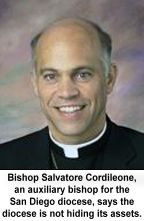Bankruptcy Judge Says Some Parish Property May Be Considered As Diocesan Assets in Four Sex Abuse Civil Cases Pending against Diocese of San Diego
California Catholic Daily [San Diego, CA]
June 15, 2007
http://www.calcatholic.com/news/newsArticle.aspx?id=e2319c12-8010-4057-befc-dc7f299f270c
Could the San Diego diocese's 98 parish properties be considered diocesan assets and so part of the pool of money available for settlement with alleged victims of clergy sexual abuse? The diocese has argued no, saying that properties belong to the parishes, not the diocese. But on June 7, a U.S. bankruptcy court judge ruled that creditors in a diocesan bankruptcy case may challenge transactions and property transfers approved by diocesan officials before bankruptcy proceeding began last February.
Faced with claims by more than 150 alleged victims of sexual abuse and the imminent opening of four civil trials, the diocese on Feb. 27 filed for bankruptcy protection. The filing put the civil cases on hold.
 |
In a report filed with the court, the diocese valued its assets at $97 million -- which did not include parish holdings. Plaintiffs, however, have challenged this reckoning, citing a series of transactions in which properties throughout the diocese were removed as diocesan assets. For instance, according to the June 8 San Diego Union-Tribune, the diocese was in the midst of a sale of the former University of San Diego High School to William Lyon Homes. According to the Union-Tribune, the developer agreed to pay $65 million for the property, but a Feb. 27 amendment to the sale deferred for several years $40 million of the sale price.
A diocesan organization, the Organization of Parishes of the Roman Catholic Diocese of San Diego, newly formed in the face of the bankruptcy case, had told parishes to transfer their funds to new accounts. In April, U.S. bankruptcy judge Louise DeCarl Adler scolded the diocese, saying she had ordered the diocese not to transfer funds while bankruptcy proceedings went forward.
In her June 7 decision, Adler said victims could challenge property transfers, but limited challenges for the time being to four test cases -- All Hallow's in La Jolla, St. Mark's in San Marcos, St. John of the Cross in Lemon Grove and St. Margaret's in Oceanside. The court will examine these test cases later this year. A decision that these parishes are diocesan assets could open challenges to the status of remaining parishes, rendering them sources for a diocesan pay out in abuses cases.
In answer to charges that the diocese low-balled the value of its assets, Bishop Salvatore Cordileone, writing on the diocesan web site, said the diocese in no way attempted "to hide its assets or deceive the court." The diocese, said Cordileone, does not obtain periodic property appraisals because it and the parishes "purchase real property and make improvements only to accomplish the mission of the Church." And, said Cordileone, "it would have been pure speculation for the diocese to have estimated market values without going through the lengthy and expensive process of obtaining professional appraisals."
"In the schedule of diocesan real property presented to the court, the diocese used the information it had available for its 34 parcels of land and buildings," said Cordileone.
The San Diego diocese has offered to settle sex abuse cases for $95 million, to be paid from diocesan assets and insurance.
Any original material on these pages is copyright © BishopAccountability.org 2004. Reproduce freely with attribution.